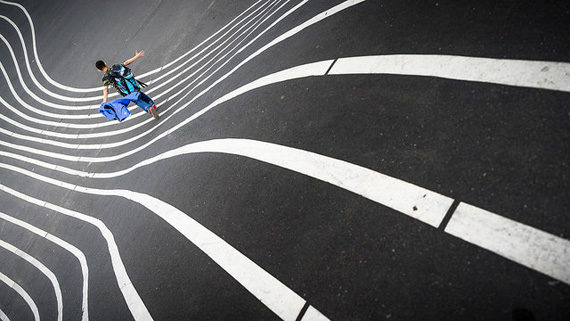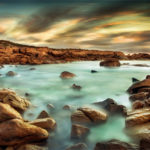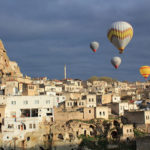If you’re interested in improving, or if you’re just looking for a fun activity, why not take on a weekend project? By choosing a specific project for the weekend you can focus on something that will give you a new experience, teach you something new, or improve your skills in a certain area. In this article we’ll look at 15 different ideas that are perfect for weekend projects.

Photo by Giuseppe Milo; ISO 100, f/4.0, 1/500 exposure.
1. Rent a Lens
I’m sure you have several pieces of gear or accessories that you have been waiting to get your hands on. Photography gear, and certainly lenses, can be quite expensive, so most of us will never be able to buy everything that we want. One opportunity that many photographers overlook is the option of renting equipment, and specifically lenses. Renting can be a great way to try it before you buy it, and if you’re looking to do something fun for a weekend, renting a lens can be a great option.
You could rent a fisheye lens and experiment with landscape or urban photos. You could rent a tilt shift lens and experiment with depth of field and perspective control. You could rent a telephoto lens of take it to a sporting event or a zoo to put it to the test. You could rent a macro lens and practice photographing flowers or insects. As you can see, there are a lot of possibilities.
There are several websites where you can rent lenses, including Borrow Lenses, Lens Rentals, and Adorama Rentals. Of course, if you’re renting a lens online you’ll need to plan ahead to allow time for it to be shipped to you. You may also have a local camera center or shop in your area that offers rentals.
2. Make a DIY Backdrop
It’s possible to take great photos right from your own home, even without having an expensive studio setup. There are loads of tutorials online that show how to create great, and in many cases inexpensive, photo booths or backdrops. Creating your own backdrop is a perfect weekend project. Just find a friend or family member and practice some portraits with your new backdrop. If you have kids this is a perfect approach to have some fun photos, and the kids can enjoy it as well.
For some ideas and tutorials see 55 Awesome DIY Photography Backdrops and 55 Fun and Creative DIY Photography Backdrops.

Photo by Promise Tangeman; ISO 100, f/3.5, 1/60 exposure.
3. Still Life Session
If you want to work on your photography without even leaving the house, still life is a great option. You don’t need anything fancy or expensive to make this work. You could photograph flowers, fruit, jewelry, toys, and any other objects you find around the house. Still life is not something that most photographers practice on a regular basis, but it can provide some excellent opportunities to work on things like composition, lighting, angles and perspective, as well as to gain more experience with your camera and lenses. If still life is new to you, you may find this article to be helpful: 10 Tips to Get Started with Still Life Photography.
4. Self Portraits
Taking self portraits can be an effective way to practice and improve without needing anyone else. Set up your tripod and experiment in your home or wherever you want. Don’t let the amount of selfies that you are bombarded with on a daily basis discourage you from taking quality self portraits. If you haven’t taken self portraits before, see How to Take a Self Portrait for some helpful tips.
5. Macro Photography
I mentioned macro photography earlier when I mentioned lens rentals, but it deserves its own section as well. You may already have a lens that can handle macro shots, or extension tubes to increase the magnification. Macro photography is a great option for a weekend project because it can be done anywhere. You can practice with flowers and plants around your house or at a local park. You can even photograph textures. Textures are everywhere, so they are easy to find if you look for them. You can even capture seasonal moods and subjects, like autumn leaves, blooming flowers, or objects covered in snow or ice.
If you’re new to macro photography see Macro Photography for Beginners.

Photo by Stuart Williams.
6. Film
Although digital photography offers plenty of benefits, there are still some things that can be learned by practicing with film. For starters, when you’re shooting with film you’ll be much more selective and careful about the photos that you take. Even when you move back to digital you’ll benefit from being more selective rather than clicking away because you have plenty of room on your memory card. Also, using film can help you to learn more about exposure. You won’t have the opportunity to change ISO, that will be set by the roll of film that you’re using, so you’ll have aperture and shutter speed to deal with. Chances are you’ll learn more about exposure, and you won’t be able to rely on making exposure adjustments in Lightroom, so you’ll need to get it right. And that’s not to mention that film produces better color and dynamic range.
If you don’t have a film camera you could possibly rent one or buy a used one to keep the costs low. If you’re new to film see 9 Shooting Film Tips for Beginners.
7. Sunrise/Sunset
Sunrise, sunset, and the hours surrounding them offer some of the best opportunities for landscapes and outdoor photography. If you’ve got a free weekend this is a great project. You don’t have to travel far. Just find a local park, lake, or some other setting that you’d like to capture at sunrise or sunset. Personally, I prefer sunrise because there are usually very few people out and you can have a lot of privacy even in more popular locations. It’s a great way to work on your skills over the weekend, and you’re likely to get some beautiful shots.
See Sunrise Photography Tips and 12 Tips for Photographing Stunning Sunsets.
8. Street Photography
Street photography is another excellent opportunity for a weekend project, and partly because it can be done anywhere, you don’t need to travel to an exotic destination. Whatever city or town you live in or near can provide the setting for your practice. Street photography can also challenge your comfort zone and force you to learn by trying new things.
See Beginner Street Photography for some tips.

Photo by Chris JL; ISO 2000, f/3.2, 1/60 exposure.
9. HDR
HDR can be a bit of a sensitive topic. Many photographers either love it or hate it. However, HDR photos don’t have to be extreme. Many of the best HDR photos aren’t the obvious, over-the-top examples. You can use HDR to improve your results while still getting realistic photos. You can take some time over the weekend to get more familiar with shooting and processing HDR. If you don’t have software dedicated to HDR, like Photomatix, you can simply use Photoshop’s HDR Pro. Photomatix and some other professional HDR software also have trial periods that you can use.
If you’re new to HDR, see this HDR Photography Tutorial.
10. Double Exposures
If you’re looking for a fun and creative weekend project, experimenting with double exposures would be an excellent choice. If you’re like most photographers, double exposures aren’t a part of your normal routines or habits, so focusing on them for a weekend will provide you with some new experience, and you may wind up with some results that you really like.
If you don’t have experience with double exposures you’ll need to get familiar with the process first. See How to Take a Double Exposure with a Digital SLR.
11. Night Photography
Night photography is another option that can be fun and challenging while adding a new skill to your arsenal. You could head out to a park or somewhere isolated for night landscapes, or go to the city and capture a totally different atmosphere and environment. Night photography introduces some new challenges, but the rewards are truly stunning photos.
You can learn more and get some tips from Night Photography Tips and Techniques.

Photo by Billy Wilson.
12. Pick a Theme
Why not take a weekend and focus on subjects with a particular theme? The theme could be anything. You could focus on architecture, strangers in the street, cars, farms, flowers and plants, railroad tracks, or whatever you want. Think about the local area where you live and the types of subjects that you can find easily. Also think about what interests you and what will help you to push your boundaries and challenge you. If you are focused on a particular theme for the weekend you will approach it much differently than if you were going to a particular location and just photographing whatever happened to catch your attention.
13. Panoramic
Another option is to practice by creating panoramic shots. You’ll need to find the right location, but creating a panoramic is not as difficult as you might think. You can use Photoshop to automatically stitch multiple photos together, or there are also a number of programs dedicated specifically to stitching panoramas.
For a guide see Panoramic Photography Tutorial.
14. Step Out of Your Comfort Zone
If you want to improve, one of the best ways is to identify your typical habits and intentionally step out of your comfort zone. If you normally shoot in aperture priority or auto, try shooting exclusively in manual for the weekend. If you typically shoot landscapes and nature, find someone to pose for portraits. If you normally shoot portraits in a studio, head outside and try street photography. If you usually stick with a particular lens, limit yourself to a different lens. The idea is simply to identify your habits and crutches, and then push yourself to try something new. Since it is just for a weekend project it’s easier to push yourself out of that comfort zone, and you’ll wind up with some new experience and you may find that you actually like it.
15. Find a Model
If you want to work on portraits, find someone to model for you. The best option here is to have a friend or family member who is willing to model for you, but if you don’t have anyone who is willing there are some other options. You could search Craigslist or post something of your own in search of a model. You could also use sites like Model Mayhem, One Model Place, and PureStorm that help photographers and models to connect.

Photo by Daniel Zedda; ISO 160, f/5.7, 1/500 exposure.
What’s your choice?
Have you chosen to take on a project for the weekend? Feel free to share your choice in the comments.
About the Author:
Marc Andre is the editor of PhotographyPla.net, a website that offers downloadable products like Photoshop actions, Lightroom presets, photo overlays, textures, and print templates.
Like This Article?
Don't Miss The Next One!
Join over 100,000 photographers of all experience levels who receive our free photography tips and articles to stay current:






Leave a Reply